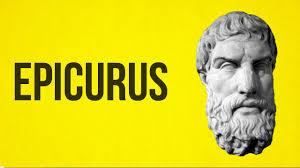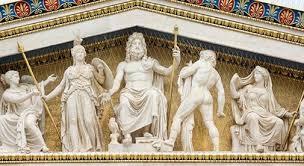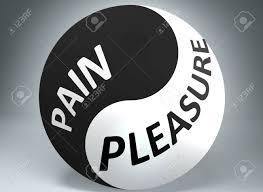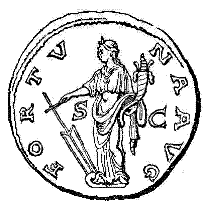At a humanist meeting there was some pamphlet including a list of worthy thinkers. My friend Peter Delivorias remarked upon the omission of Epicurus. A strange omission indeed; Peter’s noting it impressed upon me his intellectual discernment.

Epicurus (341-271 BC) was the best of ancient philosophers. He operated when Greek civilization was still fairly new, and thinkers were feeling their way through virgin territory. Like Plato, oft seen as the very father of philosophy. He was Epicurus’s bête noire, his own work a total rejection of Plato’s. To me Plato’s writings are full of pernicious nonsense; Epicurus’s are full of wisdom.
Human beings have always striven to understand existence, but reading a book about Epicurus* illuminates how far the ancients still had to go, handicapped by fundamental knowledge gaps. Thus might Plato’s errors be forgiven, though I think he was just a nasty character. Again in contrast to Epicurus, who speaks to the human heart — and who, despite the epistemological deficiencies of his time, got a lot right.

My favorite Epicurus story (possibly apocryphal) concerns his viewing a display of portraits of sailors who in storms prayed to the gods, and survived. “But where,” said he, “are the pictures of those who prayed and drowned?”
Thus the rationalist. However, Epicurus did not actually put human reason on a pedestal, subordinating it to nature. But he did liken reason to a judge, weighing evidence, the testimony of the senses. And of course we use our reason to understand nature. Thus Epicurus differed greatly from Plato, with the latter’s notion of perfect “forms” existing somewhere ethereally while what we see on Earth are just imperfect corrupted shadows. For Epicurus, what we see is what we get, that’s all there is.

So his two feet were planted in reality. Yet he did profess belief in the gods, even urging performing all the attendant rituals, as being right and proper from a social standpoint. Deeming faith a principal virtue. However, he was somewhat unique in holding that the gods could not be messing about with earthly matters (too much work, incompatible with their perfect happiness) — hence no one should fear the gods.
Consistent with putting nature above reason, Epicurus held that knowledge of the gods was instilled in people by nature as a “given” of existence. And he spun quite elaborate theories justifying this (as full of absurdities as any religious apologia). “The gods” were not some abstract picture, but highly specific, with names and backstories and everything. Yet even if nature told us about gods, could anyone know such concrete details? It all seems contrary to Epicurus otherwise being such a clear-eyed materialist. Perhaps god belief was so deeply embedded in his society that not even an Epicurus could break free of it. Or — given that so much of his philosophy already contravened contemporary sensibilities — he didn’t dare so complete a breach as atheism would entail. Epicurus, before founding his school in Athens, had already experienced being run out of town (from Mytilene).**

Epicurus deemed pleasure the purpose of life — widely misunderstood as shallow hedonism. His actual stance accords with my own oft-repeated bedrock idea that the only thing that can matter is the feelings of beings capable of feeling. Those feelings can be divided, most fundamentally, between pleasure and pain. The more pleasure there is in the world, and the less pain, the better. That’s the essence of Epicurianism.
Here again Epicurus took issue with Plato, who deemed some pleasures good and others bad. Such censoriousness has persisted into modern times. (Certainly true in Christianity.)
Epicurus did not tell us to go out and load up on sensual “hedonic” pleasures. Rather, his concern was happiness. That’s something experienced over time; ideally, a lifetime. Whereas a pleasure (like food or sex) is durationally restricted. Experiencing such pleasures (and, I would add, anticipating them) do not constitute happiness but do contribute to it.
Epicurus actually preached a simple diet, rather than indulgence in rich foods, as more conducive to health, which is a key ingredient in happiness. Yet at his Athens school, there was a monthly lavish feast. Epicurus said this conferred more pleasure in the foods than if they were everyday experiences.
Also rejected were quests for wealth, power, and glory. Thus he urged against a political career. He did recognize the value of wealth, particularly as enabling one to help out friends when needed — and Epicurus considered friendship absolutely central to a happy life. The problem with power and glory (or fame), however, is their dependency on how other people see you, making you beholden to their fickleness.

Thus conflicting with what Epicurus considered the real key to happiness: freedom. That is, the ability to control your own life, by controlling, to the degree possible, its circumstances. In this he was going against the prevailing ethos regarding fate or fortune or luck, of which most people thought we are playthings. The Romans had a goddess, Fortuna, appearing on many coins, holding a rudder, meaning that she steers us. Epicurus recognized no such force; instead dividing circumstances between those beyond our control and those we can control. With happiness built upon expanding one’s ambit of control — defying fate.
Note that this also argues against unbridled hedonism — that is, letting your appetites and passions control you rather than you controlling them. Not a recipe for true happiness.
The watchword here too was safety. The main aim of controlling your circumstances was to make you safer. That might seem a timorous, cramped idea of happiness; however, life in those times was a lot more perilous and contingent than it is for modern Americans. So the safer you could feel, the happier you’d be.
Hand in hand with safety is the idea of peace, which Epicurus also advocated for the sake of promoting human happiness. And he was also arguing here against Plato’s prescription for an authoritarian state. Plato’s ideal polity would be North Korea. Epicurus in contrast believed the state that governs best is the one that governs least. That is, protecting the safety of its citizens, not threatening it.
His physics was grounded in there being only stuff (made of atoms) and void — so the gods had to be corporeal. This also left no room for an incorporeal soul (two millennia before Descartes!) — so Epicurus ruled out any life after death. This was integral to his identifying pleasure as the purpose (telos) of life — since life’s purpose could only play out between birth and death. Actually then, life itself was what mattered most (indeed, solely); the supreme good.
Verified for Epicurus by one’s greatest fear being death, and greatest joy being an escape from it. Both being embedded by nature — thus again exemplifying his putting nature above reason.

Epicurus wasn’t happy about mortality, but he was, well, philosophical about it. It falls within the realm of things we cannot ultimately control. But we can control how we think about it. Epicurus seems to have been of the “where I am, death is not; where death is, I am not” school. I’ve never found that logic very comforting. The idea of nonexistence is terrifying. But the Epicurean control I exercise is to avoid focusing on it. I’m a believer in worrying about things only when I must. So I’ll deal with nonexistence when I get there.
* DeWitt, Epicurus and His Philosophy, written in 1954 by an academic, and unfortunately reading like it.
** DeWitt does not explore what might really have been going on with Epicurus and religion. He defends him against ancient critics, writing as though endorsing Epicurus’s theology. I infer DeWitt was a Christian; he sees Epicurus as prefiguring much of Christian thinking.
